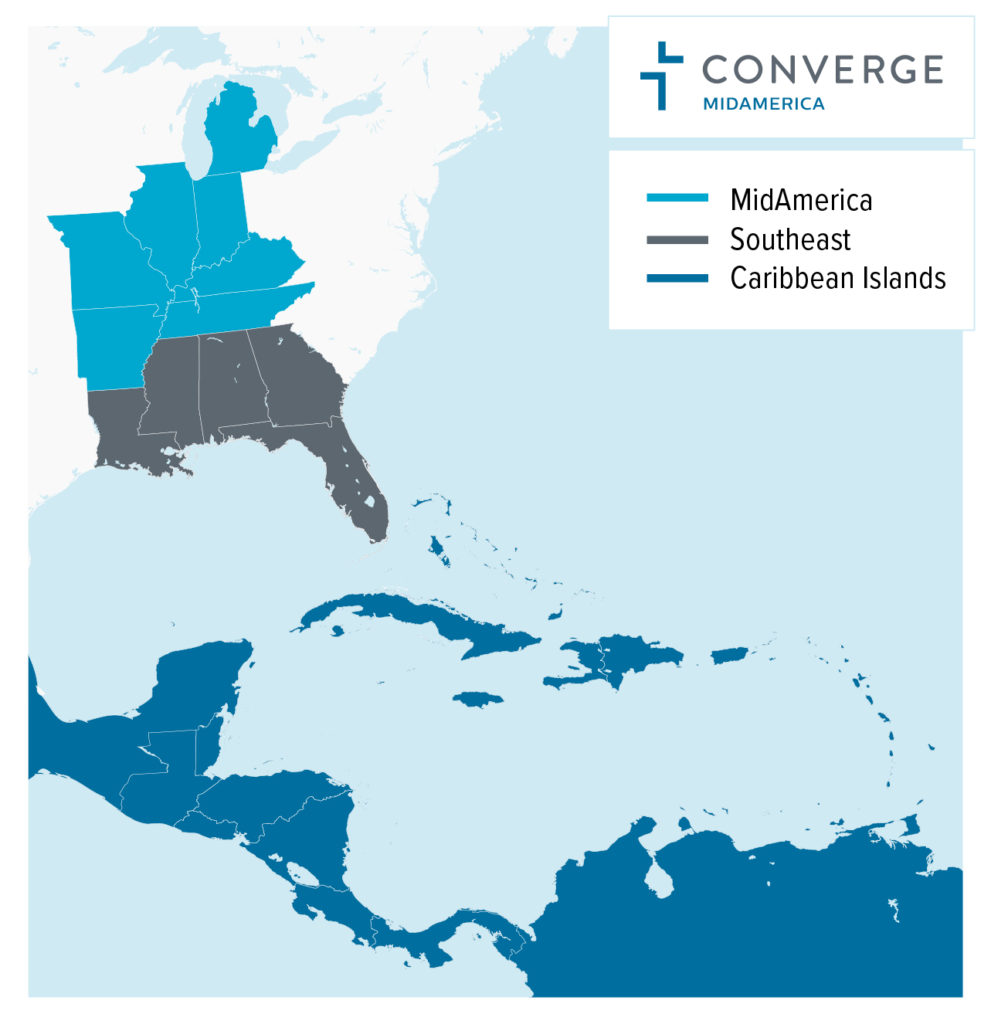Each month we highlight a church planter in our movement. In July 2020 we celebrate with Pastor Joshua Young who leads Redeeming Hope. A handful of people just came to Christ through his ministry and we couldn’t be happier for this new life!

The Gospel Opposes the Sin of Racism
Our the Executive Board of Overseers unanimously affirmed the following statement on Racism and the Gospel. We are encouraging every Converge MidAmerica pastor, staff member, and lay leader to sign this statement in affirmation of the biblical truth it promotes.

Converge MidAmerica and Southeast Districts Affirm Merger Plan

Last week, the Executive Board of Overseers for Converge MidAmerica and the Board of Stewards for Converge Southeast sensed the Holy Spirit leading us to join our ministries and unanimously affirmed a merger plan and agreement.
After two months of multi-level meetings with both boards, a joint task force and staff, we have agreed to propose this merger to the delegates of our churches for a vote of affirmation.
Converge Southeast is scheduling a virtual Annual Meeting for August 26, 2020 and Converge MidAmerica is scheduling a virtual Special Business Meeting for September 24, 2020. We will provide more information on the proposed plan and merger agreement in the next few weeks.
In preparation for this historical vote and unprecedented missional opportunity, Converge MidAmerica and Converge Southeast will be hosting a series of virtual town hall and prayer meetings. The first Town Hall Meeting will be July 28, 2020, at 7 pm CST (8 pm EST) with the Converge MidAmerica and Southeast Executive Teams.
Thank you for your prayers as we consider this opportunity.

Creating a Culture of Generosity Throughout Your Church

The Minister’s Assistance Program Needs You

Getting Ready for the “New Normal”
We all know we’re in an unprecedented time. We hear about it on the news. It’s in ads all around us. We’re living it daily both at home, at work (nowadays, these are the same place) and at our place of worship. As we are closer and closer to gradually moving on to the next phase, we can’t help but look to the future. What do we need to do to get ready for the “New Normal”?
Our strategic partner Warehouse Direct has put together a list of areas to look at in your church as you get ready to define what your “New Normal” looks like. And don’t worry, they have experts on hand to help you navigate the whole way.
Set Up for Social Distancing
Reopening safely means looking at your workspace and the common areas of your church to ensure they are optimized for social distancing. We’ve created effective spaces for many clients and can help you adapt your facility for today’s guidelines. Some things to think about:
- Do you have open seating areas that require barriers?
- Do you need additional permanent or movable partitions?
- Do you need to add barriers at the end of the aisles?
- Do you need barriers for in-person meetings?
- How will you handle in-person collaboration?
- Do you need to look into easily cleanable surfaces?
- Do you need signage or floor decals to direct traffic, tape to mark off seating for social distancing?
Prepare for Protection and Prevention
Infection control is going to be a key factor when you reopen. Incorporating health screenings, keeping PPE supplies ready, adding hands-free dispensing, and reducing touchpoints are essential. Look to us for solutions that help minimize transmission. Some areas to consider are:
- Is your bathroom optimized with hands free paper dispensers instead of air dryers?
- Do you have hands free soap and hand sanitizer dispensers in your bathrooms, kitchen, entrances?
- Have you thought about installing foot pedals on your doors (especially bathrooms) to open without contamination?
- Will you need to upgrade existing food service items like individually wrapped disposable utensils?
Make Clean a Priority
Cleaning is critical to providing a safe transition. In addition to disinfecting, sanitizing, and hand hygiene, what cleaning products do you need for the “new normal”? Some things to think about:
- You’ll probably need to increase your cleaning schedule. Do you have a written checklist so all areas are cleaned?
- Are there cleaning machines you need to help keep productivity high without adding labor?
- Are you fully stocked with sanitizers, disinfectants, soaps, and cleaning supplies?
- How are you going to keep your spaces more organized for easier cleaning?
Plan for Safety Supplies
PPE, disinfectants, and sanitizers will now be an office staple, and you’ll want at least a 30 to 60 day supply to avoid running out of difficult to find products. Our storage, dispensing, and disposal solutions will help you manage these supplies and provide easy access in public areas and at personal workspaces. Some areas to consider are:
- Do you have a stock of PPE supplies like masks or face shields?
- Do you know the different brands of sanitization wipes or hand sanitizer that is available?
Communicate Clearly
Gathering places are changing and it will be important to keep your congregation and workforce informed of the new safety requirements for anyone visiting your church. Our signage and whiteboards are a smart way to communicate new protocols, social-distancing reminders, cleaning guidelines, hallway traffic flow, and more.
- What are the areas that require additional signage?
- Do you have areas where people naturally line up or congregate around?
Ready to get situated for the “new normal” in your church?
Contact: Debbie Cladis, your Warehouse Direct Account Manager to discuss solutions for your phased in facility reopening plans.

Don’t Forget to Pray
As much as I would love to hit the reset button on 2020, that isn’t going to happen. So instead of focusing on what “isn’t” right with 2020, I have instead begun to ask the question, “God, what are you trying to teach me?” I believe he’s teaching me at least two things:
First, I believe God is reminding me that my home Is not here, but rather in heaven. The Apostle Paul says in Philippians 3:20 “Our citizenship is in heaven. And we eagerly await a Savior from there, the Lord Jesus Christ.” I say I’m looking forward to heaven, but do I really live that way? I have a nice place to live, great job, lots of food, many friends and an amazing family. God is showing me that I have become too comfortable with my “home” here on earth. Brothers and sisters, I believe God wants us to be reminded that we have a mission to accomplish here on earth, but we are not citizens here, and we must live each day with a longing to arrive at our real home that awaits us in heaven!
Secondly, God has been convicting me that in all of my conversations about the difficult things we are dealing with as a country, I am not spending near enough time focusing on prayer as a critical piece of the solution. Am I putting a priority on prayer that formulates everything I do in my personal life, my church life, and my work in Converge MidAmerica? We started three years ago a ministry called Prayer First! It was a reminder to all of us in Converge MidAmerica that we needed to put a priority on prayer as first importance. I can honestly say that I have not been living with that first of all priority like I need to.
What about you? Is prayer a first of all priority for you as you continue to dialogue with others? Is prayer a priority for your church as you continue to struggle through what’s next for your “new normal”? As the early church was formed and expanded in ways that can only be described as incredible, it was marked by a concerted effort of prayer. Not just token prayers, but nights of prayer, days of prayer, seasons of prayer and God moved! Are we praying like that?
Ephesians 6 reminds us in the explanation of the armor of God that all the pieces of armor are put on with prayer. “Pray in the Spirit on all occasions with all kinds of prayers and requests. With this in mind, be alert and always keep on praying for all the saints.” (6:18) Brothers and sisters, let us, as a movement of churches, pray on all occasions with all kinds of prayer. Let us look for ways to wrestle with God in prayer. Let us look at our schedules, our thoughts, our activities and make sure they are saturated in prayer. Let us keep striving to make “Prayer First”!
